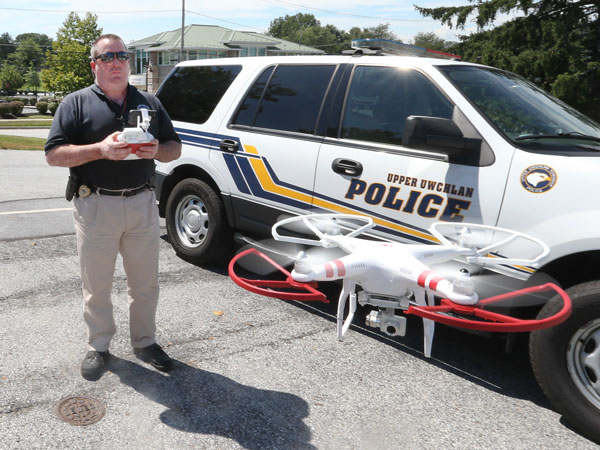
Michaelle Bond, Inquirer Staff Writer
As the camera attached to its underbelly snapped pictures, the drone glided a few hundred feet above the quiet, tree-lined suburban streets of North Coventry Township.
It was tracing the path of a killer, investigators say.
Chester County prosecutors are hoping the images captured by the unmanned device, driven by four propellers and weighing less than a half-gallon of milk, will help prove that a man arrested last month carefully planned his fatal attack on a rival who was involved with his ex-girlfriend.
As an alternative to costly helicopter reconnaissance flights, the county says, the craft that it bought last fall for $1,800 is saving taxpayers thousands of dollars.
Drones such as this one are becoming ever more popular across the nation for investigative and other purposes, with industry officials projecting that 20,000 will be purchased annually by public-safety agencies by 2025.
They also have stoked privacy concerns.
So far, 26 states have enacted drone-related privacy laws, and all but a handful of states have at least considered such laws, according to the National Conference of State Legislatures.
The New Jersey Assembly overwhelmingly passed a tough drone-related privacy-protection law in May that awaits Senate action.
On Friday, Pennsylvania state Sen. Mike Folmer (R., Lebanon) introduced a bill that would ban government agencies from flying drones without a warrant, except in emergencies, for two years to give lawmakers time to catch up.
“My concern is technology is growing faster than our ability to make sure people’s constitutional rights are being protected,” Folmer.
In Chester County three police departments, in Upper Uwchlan and New Garden Townships and Phoenixville Borough, either have or plan to buy drones for search-and-rescue, arson, and accident investigations.
Nationwide, 609 government agencies – including those involved in law enforcement, firefighting, border patrol, military training, disaster relief, and search and rescue – received permission from the Federal Aviation Administration last year to use unmanned aircraft systems, compared with 423 in 2013, and 146 in 2009.
The International Association of Chiefs of Police has recommended guidelines for law enforcement agencies using unmanned aircraft.
East Goshen Township passed an ordinance to restrict drone use in March.
The Philadelphia Police Department does not use nor plans to use drones in the near future, a spokesperson said. The New Jersey State Police and county prosecutors’ offices in the region were unaware of any police agencies using drones.
Police officials say the devices can keep officers out of dangerous situations and cover more ground quickly – say, in the case of a missing child or an armed suspect on the run, especially in rural areas.
Chester County officials said they will use drones for specific missions, not everyday surveillance, and have safeguards in place, such as requiring that supervisors sign off on any use of the aircraft.
In the case of the man accused of killing a rival, prosecutors plan to use drone images to build a court exhibit showing the defendant’s comings and goings before and after the crime.
Drones have been associated with military uses, and thus have stoked fears that government agencies will use them to spy on private lives.
County officials are reluctant even to use the word “drone,” preferring to call their aircraft a “quadcopter.”
” ‘Drone’ has a lot of connotations behind it,” said Terence Farrell, chair of the county commissioners. “This is used strictly to help people. Drones sometimes are not.”
The Upper Uwchlan Township Police Department has been using the drone it bought earlier this year to search for fugitives, to monitor traffic, and to take aerial photographs of motor-vehicle accidents.
“The problem with drones isn’t that there aren’t beneficial uses for them,” said Chad Marlow, advocacy and policy counsel at the American Civil Liberties Union. “There are potentials for abuses if police use these stealthy machines to run around warrant requirements.”
Like wiretapping equipment or any other police gear, the technology can be misused, police acknowledge.
The New Garden and Phoenixville police have asked the FAA for permission to fly drones, and departments are drafting policies to govern their use.
John DeMarco, Upper Uwchlan police chief, said that, so far, residents have not expressed concerns.
The Phoenixville Borough Council is not convinced that its police department needs a drone or the threat of liability it could bring, said Chris Bauers, a councilman.
Last month the council told its solicitor to review the police department’s policies on drones before members decide whether to allow officers to proceed.
Officers expect a decision within the next couple of months and remain hopeful that their policies will satisfy residents.
“To get the community behind us and to get them to trust us,” Chief William Mossman said, “we’re going to have to limit ourselves.”
Read more at http://www.philly.com/philly/news/20150810_Drones_give_law_enforcement_a_new_edge__but_raise_concerns.html#rvwkjfvKgiKr8bQ6.99